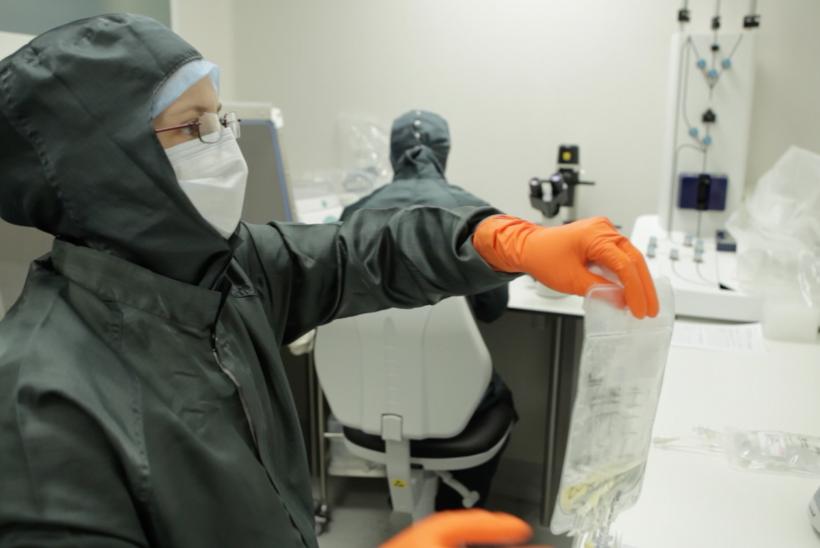New investigational gene therapy shows promise for fatal brain disease
Early results of an investigational new therapy used to treat a two-year old has shown promise, reports a Manchester team working with researchers from the UCL Great Ormond Street Institute of Child Health (ICH).
At an international conference this week, Professor Brian Bigger of The University of Manchester (UoM) shared growing evidence of the new investigational therapy’s safety and feasibility, marking a vital step forward in the treatment’s development.
The therapy is being offered to other eligible patients through a world-first clinical trial led by UoM and in collaboration with the ICH gene therapy team. The trial will be run at the Royal Manchester Children’s Hospital (RMCH), part of Manchester University NHS Foundation Trust (MFT) and is funded by Orchard Therapeutics, which holds a license and commercial rights to the programme.
The therapy was developed through a decade-long collaboration led by Professor Bigger at UoM , together with ICH researcher and GOSH consultant Professor Adrian Thrasher, and Professors Rob Wynn, Ed Wraith and Dr Simon Jones of MFT.
The investigational gene therapy for the clinical trial will be manufactured at the Zayed Centre for Research into Rare Disease in Children, a new state-of-the-art facility representing a partnership between GOSH, UCL and GOSH Charity
Sanfillippo disease type A, also known as MPSIIIA, causes progressive loss of developmental skills, deafness, hyperactivity, behavioural problems, and seizures during the later stages of the condition.
Most patients will pass away in late childhood or early adulthood.
Professor Bigger says: “These results are promising and provide some hope for these children whose condition was previously thought to be incurable. The trial is the critical next stage, but it’s true to say we are excited.
“Sanfilippo disease is an appalling disease which causes misery to these children- so the prospect of a treatment is tantalising – especially when it was thought for years that no treatment would be possible.”
Sanfilippo syndrome is caused by a ‘mistake’ in the patient’s DNA that leaves them unable to break down complex sugars in the body. These sugars build up and, over time, severely affect their brain function.
Gene therapy is designed to work by correcting the genetic mistake: replacing a ‘faulty’ section of DNA with a healthy one. Cells are taken from the patient, modified in the lab, then returned to the bloodstream, where it’s hoped they will restore production of an enzyme needed to break down complex sugars. The team will closely monitor patients treated as part of the recently launched clinical trial, to understand whether this enzyme production could ultimately slow or prevent progression of the disease.
With no effective treatments available for their condition, a two-year-old was treated with the investigational gene therapy at RMCH in 2019, under a ‘specials’ license. While it is too early to say whether the treatment will prevent the course of their disease, preliminary results six months after treatment indicate greater than normal levels of the enzyme are present in their blood.
The formal clinical trial aims to treat three to five patients aged under two years and follow each patient over the course of three years. The first patient to join the trial was treated earlier in 2020.
The clinical trial is sponsored by UoM and the gene therapy product is manufactured at the ICH, using the expertise of Professor Thrasher’s specialist gene therapy laboratories.
Over the last twenty years, GOSH’s world-leading research team has pioneered gene therapy for childhood immune conditions. Through collaborations with experts around the UK and the globe, the team are now working hard to improve and adapt the technique for other conditions, like Sanfilippo disease.
“Gene therapy is such a promising approach and we want to make sure as many children as possible have the chance to benefit,” says Professor Thrasher. “We’re very lucky at GOSH to have a brand-new facility in the Zayed Centre for Research, where we’ll be able to modify the DNA inside patient cells and prepare gene therapies that can be given back to patients for therapeutic benefit.”
The early stages of this work were funded by Great Ormond Street Hospital Children’s Charity (GOSH Charity) through their annual national funding round for child health research, as well as the Society for Mucopolysaccharide Diseases, the Sanfilippo Children’s Research fund and Orchard Therapeutics.
The manufacturing work on the study was supported by NIHR Great Ormond Street Hospital Biomedical Research Centre (BRC).
NOTES FOR EDITORS
For more information about the MPS-IIIA gene therapy trial, please contact the trial manager at mpsiiiatrial@manchester.ac.uk, the clinical lead Prof. Wynn robert.wynn@mft.nhs.uk or visit ClinicalTrials.gov (NCT04201405).


